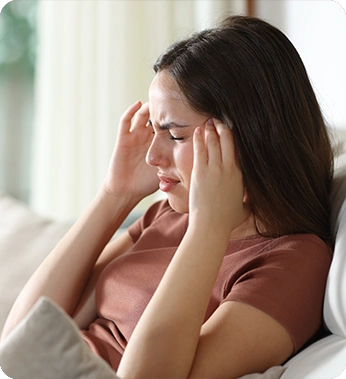Migraine Treatment in Homeopathy
Heals migraine gently from the root without side effects
Book your Appointment
If you've ever had to cancel plans, shut the curtains, or pop a pill just to get through the day, you're not alone. Migraines aren't just headaches. They're overwhelming, recurring, and exhausting. And while painkillers might give momentary relief, the problem often comes back stronger
At Dr Batra’s®, we understand what you’re going through. We’ve seen how migraines affect not just your head, but your energy, work, relationships, and peace of mind. That’s why our homeopathy-based care doesn’t just cover symptoms, it helps reduce attacks by healing from within. We work on your stress, triggers, and overall well-being
Our migraine treatment focuses on gentle, root-cause healing rather than just short-term symptom relief. Here’s why thousands trust Dr Batra’s®:
4,000+ Migraine Patients Treated
Proven success with years of experience in migraine management
300+ Doctors & 200+ Clinics
Expert homeopaths offering dedicated migraine care globally
Customised Migraine Plans
Personalised treatment customised to your type of headache and life stressors
Gentle, Non-Sedative Medicines
Safe for all ages with no dependency or side effects
Transparent Outcome Reports
Progress tracked through regular doctor observations and follow-ups

Reduces how often and how long migraines last
Tackles deeper causes like stress, hormones, or weak digestion
Helps you sleep better and feel more balanced
Builds long-term resistance to triggers
No drowsiness or dependency
A study published on PubMed observed that patients undergoing homeopathic treatment for migraine showed significant improvements sustained over a 24-month period. However, as an observational study, it does not conclusively establish whether the improvements were specifically due to the treatment itself

Step 1
Detailed consultation with a migraine expert
Step 2
Understanding your symptoms, stress levels, and triggers
Step 3
Personalised homeopathy medicine & simple lifestyle tips
Step 4
Regular doctor check-ins to monitor progress
Step 5
Continued support to keep headaches from coming back
Focuses on what’s really causing your migraine
No side effects or long-term risks
Works gently and builds up over time
Safe for teenagers, working adults, and seniors
Supports your emotional and physical health together
| Feature | Conventional Medicine | Homeopathy |
|---|---|---|
| Relief Type | ||
| Side Effects | ||
| Emotional Support | ||
| Recurrence | ||
| Personalisation |
If you’re tired of regular painkillers
If stress, periods, or travel often trigger your headaches
If your migraines are affecting your work, sleep, or mood
If you want a safe, natural way to feel better for good
Yes, homeopathy helps reduce the frequency and intensity of migraines, offering long-term relief
Medicines like Belladonna, Glonoinum, and Iris Versicolor are often used, depending on symptoms
Homeopathy works gently without side effects, unlike allopathy which often relies on sedatives
Sanguinaria Canadensis is commonly used, but your prescription depends on your full case
Yes, personalised homeopathy helps reduce visual symptoms and prevents future episodes